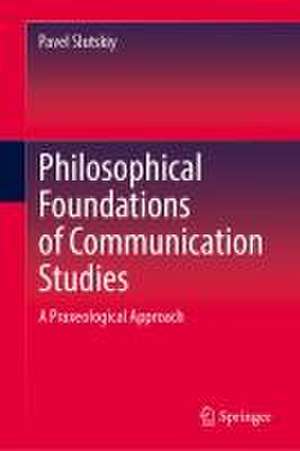Philosophical Foundations of Communication Studies: A Praxeological Approach
Autor Pavel Slutskiyen Limba Engleză Hardback – 3 sep 2024
Preț: 730.02 lei
Preț vechi: 890.27 lei
-18% Nou
Puncte Express: 1095
Preț estimativ în valută:
139.71€ • 144.33$ • 116.27£
139.71€ • 144.33$ • 116.27£
Carte tipărită la comandă
Livrare economică 26 martie-09 aprilie
Preluare comenzi: 021 569.72.76
Specificații
ISBN-13: 9789819710126
ISBN-10: 981971012X
Ilustrații: VIII, 192 p.
Dimensiuni: 155 x 235 mm
Greutate: 0.51 kg
Ediția:1st ed. 2024
Editura: Springer Nature Singapore
Colecția Springer
Locul publicării:Singapore, Singapore
ISBN-10: 981971012X
Ilustrații: VIII, 192 p.
Dimensiuni: 155 x 235 mm
Greutate: 0.51 kg
Ediția:1st ed. 2024
Editura: Springer Nature Singapore
Colecția Springer
Locul publicării:Singapore, Singapore
Cuprins
1. The Nature and Relevance of Communication Philosophy.- 2. The Ontology of Communication: Defining the Essence.- 3. Meaning in Human Communication.- 4. Probability in Human Communication: Shifting Perspectives.- 5. Free Will and Communication: Predictability of Actions.- 6. Subjective Probability and Common Knowledge.-7. The Role of Communicative Conventions.- 8. Positivist Paradigm in Communication Studies.- 9. Interpretivist Paradigms in Communication Studies.- 10. Epistemological Questions of Communication Research Paradigms.- 11. Epistemological Monism.- 12. Rationalist Alternative and Praxeology of Communication.- 13. Praxeology and Speech Act Theory.- 14. Looking at Human Communication from the Praxeological Perspective.- 15. Intentionality of Human Communication.- 16. Studying Communication as Human Action.
Notă biografică
Pavel Slutskiy holds a full-time position of Associate Professor in Communication Management at the Faculty of Communication Arts, Chulalongkorn University, Bangkok. He also holds Associate Professorship in Public Relations from Saint-Petersburg State Electrotechnical University—the first higher education institution in the country to offer a program in PR. He was born in Russia, where he earned his Ph.D. in Journalism (Political Science) from Saint-Petersburg State University. Since 2014, he has worked in Thailand. His research interests include political and legal philosophy of communication, communication theory, philosophy of language, cross-cultural communication, strategic communication and public relations. He is the author of “Communication and Libertarianism” (2021). He is also Author of three other monographs, three university textbooks, and numerous articles which were published in American Behavioral Scientist, Libertarian Papers, Journal of Promotional Communicationsand Quarterly Review of Business Disciplines, among others.
Textul de pe ultima copertă
This book explores the philosophical foundations of communication studies, suggesting that communication phenomena extend beyond the scope of traditional scientific methods. It argues that communication, deeply intertwined with human behavior, cannot be fully comprehended through empirical methods alone. The book presents an epistemological alternative to empiricism in communication studies—an alternative rooted in the praxeological perspective. Drawing from the principles of rationalism, it proposes that conclusions about communication can be deduced from a priori theoretical truths, rather than empirical evidence. This book is a crucial resource for scholars in both philosophy and communication studies.
Caracteristici
Addresses a significant deficit within the philosophy of communication Presents an epistemological alternative to empiricism in communication studies Connects to a solid philosophical doctrine with a growing support base
